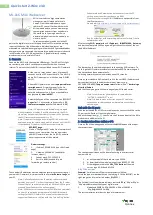
Chapter 3. Plug-in Implemented Server Functionality Reference
176
dbcachehitratio
This attribute shows the percentage of requested pages found in the database cache (hits/tries).
dbcachepagein
This attribute shows the pages read into the database cache.
dbcachepageout
This attribute shows the pages written from the database cache to the backing file.
dbcacheroevict
This attribute shows the clean pages forced from the cache.
dbcacherwevict
This attribute shows the dirty pages forced from the cache.
3.4.3. Database Attributes under cn=NetscapeRoot, cn=ldbm
database, cn=plugins, cn=config and cn=userRoot, cn=ldbm
database, cn=plugins, cn=config
The
cn=NetscapeRoot
and
cn=userRoot
subtrees contain configuration data for, or the
definition of, the databases containing the
o=NetscapeRoot
and
o=userRoot
suffixes. The
cn=NetscapeRoot
subtree contains the configuration data used by the Administration Server for
authentication and all actions that cannot be performed through LDAP (such as start/stop), and the
cn=userRoot
subtree contains all the configuration data for the user-defined database.
The
cn=userRoot
subtree is called
userRoot
by default. However, this is not hard-coded and, given
the fact that there are going to be multiple database instances, this name is changed and defined by
the user as and when new databases are added. The
cn=userRoot
database referenced can be any
user database.
The following attributes are common to both the
cn=NetscapeRoot, cn=ldbm database,
cn=plugins, cn=config
and the user database, such as
cn=userRoot
or
cn=
database_name
,
cn=ldbm database, cn=plugins, cn=config
subtrees.
3.4.3.1. nsslapd-cachesize
This attribute has been deprecated. To resize the entry cache, use nsslapd-cachememsize.
This performance tuning-related attribute specifies the cache size in terms of the number of entries
it can hold. However, this attribute is deprecated in favor of the
nsslapd-cachememsize
attribute,
which sets an absolute allocation of RAM for the entry cache size, as described in
Section 3.4.3.2,
“nsslapd-cachememsize”
.
Attempting to set a value that is not a number or is too big for a 32-bit signed integer (on 32-bit
systems) returns an
LDAP_UNWILLING_TO_PERFORM
error message with additional error information
explaining the problem.
The server has to be restarted for changes to this attribute to go into effect.
Summary of Contents for 8.1
Page 8: ...viii ...
Page 14: ...xiv ...
Page 16: ...2 ...
Page 250: ...236 ...
Page 334: ...320 ...
Page 372: ...358 ...
















































